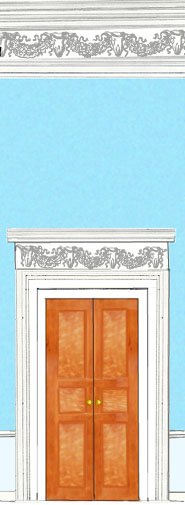Conversations in the Dining Room |
|||||||||||||||
|
Emma Knytleigh: In an attempt to record the current history of Stoney Grove a number of interviews and conversations will be recorded with some of the people who have connections with the estate. Accordingly the Dining Room has been supplied with hidden microphones and recording equipment to allow the process to take place in as natural a setting as possible. Participants are, of course, aware that conversations are being recorded. Transcript: "Interpretation Committee" meeting , Afternoon, 25 August, 1999. Present AS, ST, EK, FC, SJ, MJ, CV Ann: Emma, is the tape on? Emma: Yes, I just turned it on. Ann: Thanks. Well, as you know, there's been the suggestion that we open the house up for tours on some sort of regular basis. It would allow us to apply for some tax relief, and to get more of the place restored. I thought before a decision was made whether to go ahead or not, we should start by talking about what we'd want people to learn here if and when they come. Simon: Why do they need to learn anything? Give 'em a cup of tea and a cake, let them wander around, sell a few postcards and provide a loo. What else do we need to do? Ann: We can't just have people wandering around aimlessly. There needs to be a point to it. Simon: Ah, yes. A point. Getting out of their own houses seems point enough to me. Emma: Well, you're paying me to do research. You might as well use it. It's already out there on the web. Frank: Are you happy with the story so far? Simon: As a matter of fact, no. From what you've told me, you've got a pampered "lady" who poisons her husband, her daughter who lives forever and was probably a royal pain in the ass, a playboy who ran off with his secretary after mucking up the house, and then the most recent lot--a fascist, a God-awful looking old maid, and a homosexual. Why don't you just cut through the historical BS tell it like it was instead of dressing it up? Ann: Simon! Emma: We don't know any of that yet. Shirley: I know for a fact that Mr. Montogomery wasn't a homosexual. Frank: And if he were, it's nobody's business. Martin: Humph. Ann: I agree with Emma completely. She's just starting her research. We don't know anything for sure about where Fanny Blake came from, or how her husband died, or much at all about the family in the nineteenth century. Emma's got a long list of questions about the last owners. We can't just start making assumptions! Emma, where do you think we should go next? Emma: That's up to you--it's your project. Frankly, I don't really care about any of this stuff. I haven't had a chance to touch on the people who really mattered here--the gardeners, house servants, tenants. They're the ones that kept the place going, who built the place so that the William Halls of the world could play. Martin: Yes. The gardeners. You should find out more about them. Simon: You think people are going to come all the way out here to learn about the gardeners? Why? Martin (to himself): Well, we've grown some pretty fine vegetables ... Shirley: I think Mr. Tinsley is right. Who cares about the house servants? We're always under appreciated. Ann: I agree with Emma. We have to look at everyone who was here. It just seemed easier to start with the owners. People need to understand them to appreciate Stoney Grove. Frank: I think you're all missing the point. Go stand out on the lawn at dusk, or by the lake as the sun is coming up. Smell the earth. Listen. That is what this place is. It's everything that happened here, and everything that will happen. If you pay attention, you don't need a guidebook or a web site. Having holidaymakers wandering around to learn about William Blake or Miss Hall is not going to change them, or it. If you want people to know Stoney Grove, ask them to listen, to feel. Ann: I see your point Frank, but not everyone has your, well, sensibilities. I do think there's value in talking about the past, in learning about it. We're all trying to pin down something intangible--the uniqueness of a place, the importance of being connected to something larger than ourselves. I just think people need some tools. Chester: I think Ann's right. I don't see how you can miss it; the story is the house. This is a magnificent piece of architecture, with a rich story of eighteenth-century design to tell. People will flock to hear it. Emma: Will they? Do you really think there's something intrinsically valuable about eighteenth century buildings, or are we just trying to convince everyone that they should stay in their place, to show them there have always been hierarchies, and wealthy people that set the rules, so that the rules we follow now are natural and we shouldn't question them? Simon: I think we're just wasting time. Do what you want. Fill the house with gentlemen--or gardeners. The thing is, figure out a way to fill it with sight-seers so we can make some money. Not that it's so important now. I heard from the lawyers--we're getting some cash out of the lottery after all. Ann: Really? What happened? Simon, don't go. We aren't finished yet. Simon: Aren't we? |
||||||||||||||

